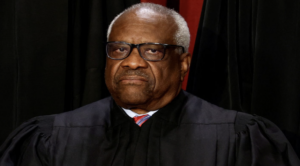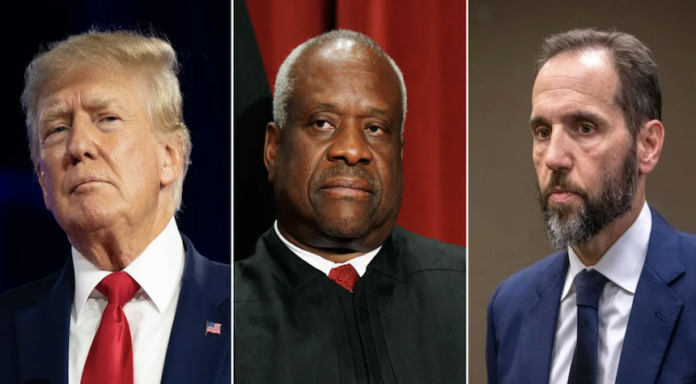The Supreme Court issued a mixed ruling on Monday regarding presidential immunity. In my view, they took what could’ve been a straightforward and elegant decision — the president is immune from prosecution for acts committed in office unless he has been impeached for those acts — and turned it into a dog’s breakfast of angels-on-the-head-of-a-pin litigation about what constitutes official and unofficial acts.
Clarence Thomas’ concurrence has been passed without much notice. Justice Thomas claims that the Court puts the cart before the horse. It is not the first question to answer whether or not acts were official. First, it is important to determine whether or not this prosecution is legal. Thomas’s comments start on page 44 of the linked document.
Separately, I would like to point out another possible way that this prosecution could violate our Constitutional structure. In this case, the Attorney General claimed to have appointed a private citizen to act as Special Counsel on behalf of the United States to prosecute an ex-president. However, I’m not certain that a Special Counsel office has been “established” by law as required by the Constitution. Art. II, SS2, cl. 2. The Constitution, by requiring Congress to create federal offices “by Law”, imposes a check on the President. He cannot create offices as he pleases. The Special Counsel cannot pursue this case if no law establishes the office he occupies. Private citizens cannot criminally pursue anyone, much less a former president.

In the 200 years since our nation was founded, no former president has been criminally prosecuted for the acts he committed while in office. This is even though numerous former Presidents have taken actions that many people would consider crimes. This unprecedented prosecution must be carried out by someone who has been duly authorized by the American people. Before proceeding, the lower courts must answer these questions about the appointment of the Special Counsel.
It is still questionable whether the Attorney-General filled the office of Special Counsel following the Appointments clause. It is important to determine whether the Special Counsel has a superior or principal office. In the first case, the appointment of the Special Counsel is invalid, because he was not appointed by the President, and confirmed by the Senate as must be the case for principal officers. Art. II, SS2, cl. 2. Even if the officer is inferior, the Attorney general can only appoint them without presidential nomination and senatorial approval if “Congress” confirms it. . . Ibid. The Special Counsel appointment is invalid unless there was a statute that created the office of the Special Counsel and gave the Attorney-General the authority to fill it by law.
It is not a trivial technicality to ask whether the office of Special Counsel was “established by Law”. The Executive has no power to create and fill a certain office if Congress does not agree that it should exist. The Special Counsel is claiming to be the Executive Branch prosecutor, so the consequences of his actions are significant. The separation of powers in our Constitution, which includes the power to create and fill offices, is the “absolutely central guarantee” of a just government and the freedom it provides for all. Morrison, supra, 487 U. S. at 697. (Scalia J., dissident). No prosecution can justify putting it in danger.

In my unlawful opinion, this is almost unprecedented. Thomas uses this case to attack the core of the indictment brought against Trump by Jack Smith, the minion of Attorney General Merrick Garland.
The argument made by Trump’s legal team before Federal District Judge Aileen Cain was similar.
The defense team of former President Donald J. Trump tried to convince the judge overseeing national security documents to dismiss the indictment on Friday, arguing that Jack Smith was not appointed properly.
Jack Smith, the media and right-wingers have been attempting to deceive you into believing that the arguments are bogus. These people also told you Joe Biden’s physical decrepitude and dementia were fakes created by the right-wing media.
Do not believe them. Smith’s case has a particularly weak foundation because the Senate did not confirm him to any federal government position. Even if the Justice Department’s internal special counselor rule is legal there is still a question mark hanging over Smith’s capability to fill that position.
Thomas must be aware of the backlash he will receive for using his concurrence to support an argument Trump’s legal team makes in court. He has done an excellent job in bringing this issue to light. The idea that an Attorney General could use a Justice Department internal regulation to select some random bearded rogue to prosecute a former President on a political basis is a joke that belongs in Pakistan and Sudan, not the United States.




